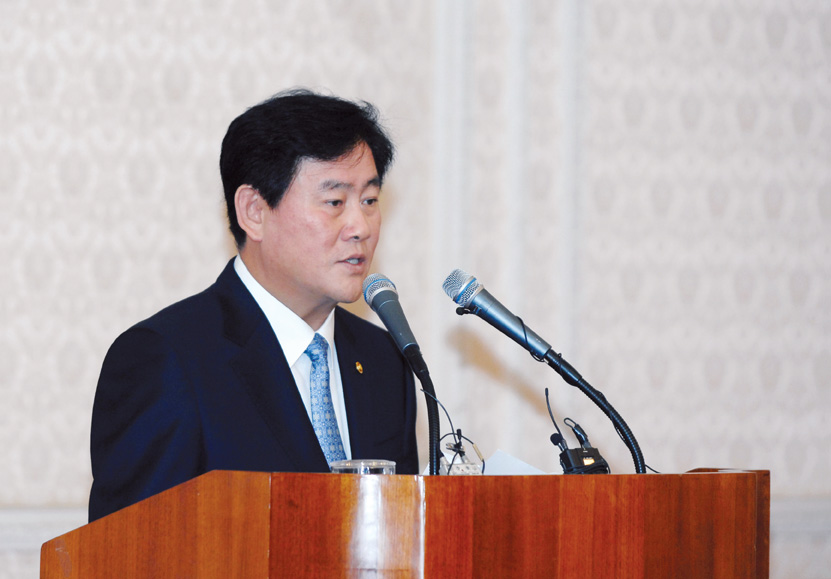More Say in Policy-Making
MKE Minister Choi quick to take control of his ministry, strives to enhance its standing
 Minister Choi Kyung-hwan of the Ministry of Knowledge Economy (MKE) now a little more than one month in office, has begun to show his own assertive, charismatic leadership unlike his predecessor.
Minister Choi Kyung-hwan of the Ministry of Knowledge Economy (MKE) now a little more than one month in office, has begun to show his own assertive, charismatic leadership unlike his predecessor.
A politician-turned government minister, Choi has something in common with his predecessor: the two are both alumni of Yonsei University and the University of Wisconsin and they began their respective careers in officialdom at the predecessor of the Ministry of Strategy and Finance (MOSF).
However, unlike his predecessor¡¯s calm work style, the new MKE minister, responsible for policies directly related to the real economy, has already moved into an assertive mode, seeking more say in government and industry.
Minister Choi is quick to take control of his ministry and more determined to step up his ministry¡¯s standing as a government policymaking agency. Choi, who once had a stint in the journalism field, retains a representative¡¯s status as a member of the ruling Grand National Party.
Choi¡¯s focus in the initial stage of his tenure is to create a business-friendly atmosphere, ramp up the MKE¡¯s standing and tighten discipline inside and outside of the ministry.
He has made his case different from other ministries¡¯ position on such issues as greenhouse gas emission reduction scenarios and the cancellation of a temporary tax exemption system.
The MKE minister told a meeting of reporters at the Gwacheon Government Complex building on Oct. 19 he concurred on the direction of green growth and greenhouse gas emissions reduction. But the problem is how much the national economy should suffer under the burden or how costs can be shouldered, he added. The reality is that the contention that greenhouse gas emissions reductions could cost the economy is behind the times, but he made it clear he would make his case in tune with the voices of the business field.
He also disputed the MOSF¡¯s plan to revoke the temporary tax exemption system, introduced in 1982 to exempt companies making facility investments from parts of corporate tax and income tax. Choi said, ¡°It¡¯s true that the economy is turning around, but private investment and employment situations are still weak, so the plan should be reconsidered.¡±
The minister also issued a strongly worded warning against ¡°egoist views¡± and the negligence of duties on the part of public organizations under the umbrella of the MKE.
Minister Choi unveiled the fact that he recently met with KEPCO Chairman and CEO Kim Ssang-soo to discuss the controversial reconsolidation of KEPCO and power companies and Korea Gas Corp. President Choo Kang-soo to talk about the competitive importing of liquefied natural gas. He said he cautioned them to not make their own case without fine-tuning policies with the ministry.
Concerning the reconsolidation issue of KEPCO and power companies, Minister Choi said both sides have been blaming each other, using favorable commissioned research outcomes, and the MKE will commission the Korea Development Institute to conduct an in-depth study into the issue and make a final decision by the first half of next year. He indicated his negative position toward the reconsolidation issue, saying that the restructuring of the power industry is in a transition, and if they are merged again, the restructuring process will end. He said a decision may be made when things change for the good following the transition period.
The minister reiterated an overhaul of R&D support, unveiling what he discussed during his meetings with the chiefs of the National IT Industry Promotion Agency (NIPA), the Korea Institute for the Advancement of Technology (KIAT) and the Korea Evaluation Institute of Industrial Technology (KEIT).
Earlier, he ordered the implementation of the RCMS, a tool designed to ensure real-time R&D fund flows, efficiency and transparency, citing the fact that even if large amounts of money are poured in, a flimsy R&D support system cannot achieve R&D outcome efficiency and fundamental innovations. The step he took three days after his inauguration reflects well his belief that what he believes is right can be pushed resolutely.
Choi noted that he turned down a management plan presented by the NIPA president, saying that it came under criticism over the alleged doling out of information and telecommunications funds and he should have come up with alternatives to overhaul the practice. He told the KIAT and KEIT presidents to draw up and present their management plans so that such substantive contents as how to reshuffle R&D tasks numbering more than 2,000 can be contained.
Lawmakers divulged many cases of officials¡¯ negligence of duties surrounding public organizations and associations under the umbrella of the MKE during a parliamentary interpellation, saying that an intensive audit has been conducted of venture associations and that he ordered an inspection of 19 public organizations and associations.
In his inaugural speech, Choi, hailing from Cheongdo, well known as the birthplace of the traditional Korean bullfight, spoke of bullfighting competitions in which swift, high-tech bulls have better chances of winning than strong, muscular ones. ¡°Our economy is not a big one, but the nation, fitted with the world¡¯s top-rated manufacturing and most advanced IT, has a nimble, high-tech-oriented economy, Korea¡¯s strong point as a knowledge-based society in the 21st century,¡± he said. nw
Minister of Knowledge Economy Choi Kyung-hwan delivers his inaugural speech at the Ministry of Knowledge Economy on Sept. 21.
3Fl, 292-47, Shindang 6-dong, Chung-gu, Seoul, Korea 100-456
Tel : 82-2-2235-6114 / Fax : 82-2-2235-0799